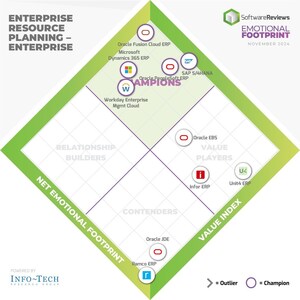New research from the global IT research and advisory firm suggests higher education institutes should avoid focusing on risk and probability analysis to drive their continuity strategy. Instead, Info-Tech Research Group advises developing a flexible plan to enable business resumption regardless of the disruption.
TORONTO, Oct. 18, 2023 /PRNewswire/ - Post-secondary institutions experienced significant fallout amid the COVID-19 pandemic, struggling to effectively transition from in-person, campus-based learning to virtual classrooms. As unprecedented events and the business disruptions they cause become more common, the need for higher education institutes to have an effective business continuity plan (BCP) is becoming increasingly evident. Institutions must now prepare for additional unpredictable events to avoid challenges in the future. To support IT leaders in their efforts to implement a structured, repeatable process and enable their organizations to resume business in the face of disruption, Info-Tech Research Group has released its new research blueprint, Develop a Business Continuity Plan for Higher Education.
"None of us needs to look very far to find a reason to have an effective business continuity plan. From pandemics to natural disasters, supply chain disruptions, and IT outages, there is no shortage of events that can disrupt the complex and interconnected business processes within higher education." says Frank Trovato, research director of IT Infrastructure & Operations at Info-Tech Research Group. "It can seem overwhelming to build a plan that addresses all these threats, but there are several data-backed tactics that can streamline the development of a business continuity plan."
The firm's research highlights some of the tactics IT leaders can use to stay on track when developing their institution's BCP, including focusing on one business unit at a time, establishing a repeatable process, and producing deliverables that provide a starting point for the rest of the organization.
Also included in the resource are several complexities higher education institutes must be aware of when creating a BCP, such as technology dependency, the need for support mechanisms beyond technology, students' diverse technology skill sets and engagement levels, and financial restrictions.
To employ the tactics outlined in Info-Tech Research Group's research blueprint and address the challenges presented by the complex nature of higher education, IT leaders can follow the firm's four-phase process. A breakdown of the process can be found below:
- Phase 1: Identify BCP maturity and document process dependencies
The first phase requires IT leaders to assess the current BCP maturity, establish the pilot BCP team, and identify business processes, dependencies, and alternatives. - Phase 2: Conduct a business impact analysis (BIA)
Phase two involves defining an objective impact scoring scale, estimating the impact of downtime, and determining acceptable recovery time objective (RTO) and recovery point objective (RPO) targets. - Phase 3: Document the recovery workflow and projects to close gaps
In phase three, participants will determine current recovery procedures, identify and prioritize projects to close gaps, and evaluate business continuity site and command center options. - Phase 4: Extend the results of the pilot BCP and implement governance
The fourth and final phase guides IT leaders through consolidating BCP pilot insights to support an overall BCP project plan, outlining a business continuity management (BCM) program, and testing and maintaining the BCP.
"No one can predict every possible disruption, but it is possible to build a flexible continuity plan that allows organizations to withstand the threats they may face," explains Trovato.
Info-Tech Research Group advises IT leaders in higher education that it is not possible to address all their organization's continuity challenges at once. Rather, the firm suggests prioritizing high-value, low-effort initiatives and creating a long-term roadmap for the remaining projects and related obstacles.
To access the full blueprint, including Info-Tech Research Group's methodology to right-size and streamline the BCP development process and a comprehensive explanation of the firm's four-phase process, download Develop a Business Continuity Plan for Higher Education.
For media inquiries on the topic or to get exclusive, timely commentary from Info-Tech's industry analysts, please contact PR manager Sufyan Al-Hassan at [email protected].
For information about Info-Tech Research Group or to access the latest research, visit infotech.com and connect via LinkedIn and X.
Info-Tech Research Group is one of the world's leading information technology research and advisory firms, proudly serving over 30,000 IT professionals. The company produces unbiased and highly relevant research to help CIOs and IT leaders make strategic, timely, and well-informed decisions. For 25 years, Info-Tech has partnered closely with IT teams to provide them with everything they need, from actionable tools to analyst guidance, ensuring they deliver measurable results for their organizations.
Media professionals can register for unrestricted access to research across IT, HR, and software and over 200 IT and industry analysts through the firm's Media Insiders program. To gain access, contact [email protected].
SOURCE Info-Tech Research Group

WANT YOUR COMPANY'S NEWS FEATURED ON PRNEWSWIRE.COM?
Newsrooms &
Influencers
Digital Media
Outlets
Journalists
Opted In





Share this article